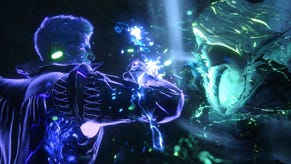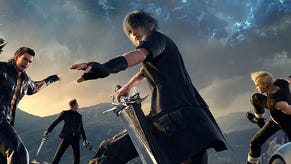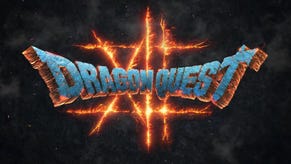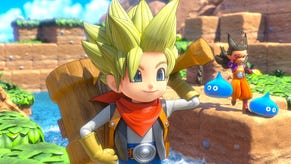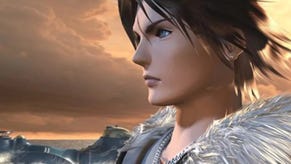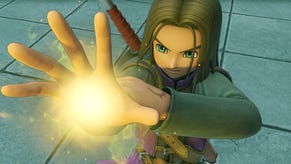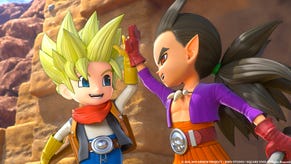The History of RPGs: How Dragon Quest Redefined a Genre
COVER STORY: 30 years ago, a small team of Japanese game designers changed the way the world looked at role-playing games.
This article first appeared on USgamer, a partner publication of VG247. Some content, such as this article, has been migrated to VG247 for posterity after USgamer's closure - but it has not been edited or further vetted by the VG247 team.

Role-playing for everybody
A tremendous part of Dragon Quest's success came from one of the game's biggest innovations of all: Clemency. Previous RPGs typically offered no mercy to players, imposing harsh (sometimes unaffordable) resurrection penalties for the crime of losing a party member in battle — something practically unavoidable in the early going of adventures like Wizardry. A party wipeout in PC RPGs meant losing all progress since the player's last save, sometimes resulting in a setback of an hour or more. And Dragon Quest could be pretty brutal at times; every time you crossed a bridge in the overworld, you'd encounter new and deadlier monsters employing never-before-seen powers, often leading to a wipeout. However, after falling in battle, your hero would awaken back in the king's throne room, with all experience points and items intact. Your only penalty: A stern admonition from His Majesty, and the loss of half your cash on hand.
The idea behind this modest but not massive penalty was that it would allow even new RPG players to win with sufficient determination. No matter how many times you lost in battle, you could return to the battlefield and steadily earn more experience, eventually leveling yourself to the point that you could conquer your sticking point through sheer force of statistics. The series has retained this fundamental design tenet through the decades; later entries have even lessened the monetary penalty for failure by offering a bank where players can deposit gold for safekeeping in increments of 1000, ensuring that an ongoing effort to save up for some big-ticket item isn't undermined by a streak of bad luck.
"Dragon Quest embodies the Japanese ideal of hard work = success," says Alex Fraioli, an American expatriate who runs the retrogaming bar Critical*Hit in Nagoya. "If I grind enough, surely I deserve to win. Life isn't always like this, but it feels nice when you can apply it.
"The series has a strong sentimental impact in Japan as well. I talk with a lot of salarymen about the series at my bar, and when it comes to DQV I always ask them who they married. They always say Bianca, and I always high-five them because of it. DQ doesn't have that same wistful vibe in the west. Enix of America took a break from the series after IV because sales were declining with each installment, but the people who did play it do feel as strongly as the Japanese crowd. They're not perfect, but the mobile ports of the earlier games should be on every teen's phone."

Besides its generally forgiving design and philosophy of scrupulously guiding players toward their next goal with a minimum of obfuscation, Dragon Quest also made itself accessible in more subtle ways. For starters, Nakamura and Horii chose not to use the Dungeons & Dragons-style THAC0 combat rules seen in many PC RPGs, including the inspirational Wizardry series. Instead of centering battles around evasion, Dragon Quest went with a more straightforward system in which attacks sometimes missed but generally landed. Damage to both hero and foe was calculated as a simple comparison of offensive vs. defensive stats, with some unpredictability present in a small random damage modifier multiplier and the potential for either side to land a rare and precious critical hit.
As with many things about the original Dragon Quest, its one-on-one combat based around simple stats and math make for a game that feels incredibly simplistic by modern standards — or even in comparison to PC RPGs of the ’80s. Again, that was the point: Dragon Quest didn't simply have to sell prospective fans on a new series. It had to introduce Japanese gamers to the entire concept of RPGs, which until that point were largely unknown in Japan outside of a small corner of computer-owning import enthusiasts. It was a tall order, and its creators were taken aback by the public's initial indifference to the game.
"Actually, when I was creating Dragon Quest, I was very confident that it was going to become a hit," Nakamura said. "The game was great, and they had this famous comic artist, Akira Toriyama, doing the art and everything, so I was very confident it was going to be a huge hit. Eventually it sold 1.1 million copies, but the first numbers were just around half that, about 600,000. I was expecting it to be a bigger hit, so to be honest, I was a little disappointed with the numbers."
Thankfully, the Toriyama connection paid off in a different way: Dragon Quest received heavy promotion after launch in the weekly comics magazine Shounen Jump, an incredibly popular publication whose centerpiece was Toriyama's Dragon Ball manga. Between those ads and positive word-of-mouth, the game slowly gained a following. When the sequel arrived a year later, it found a much warmer reception.

"When Dragon Quest II came out, the original sales projections we had from distributors was 700,000. But then the game was delayed for a few months, and the numbers went down to 400,00 million. We thought, 'OK, it's not going to sell quite as much.' But then, once it was out in stores, it created a huge panic — the Dragon Quest panic — everybody wanted Dragon Quest, and the stores all sold out."
With the success of the sequel, Dragon Quest became one of the biggest things going in Japanese games. The launch-day crowds that lined up for the third game in the series were reported on overseas, and concerns that students were skipping school in order to buy new Dragon Quests transmuted, telephone game-style, into urban legends that the Japanese government outlawed the release of Dragon Quest sequels on schooldays.
Since then, the franchise has walked a remarkable line between tradition and innovation. As with the very first game, Dragon Quest makes use of player expectations as a comfortable, familiar base, then tweaks specific details to create something different than what's come before. Dragon Quest II began with a single protagonist, like the original, but along the way the hero met two additional party members whose presence changed the nature of combat. Dragon Quest III introduced a proper class system, complete with customization, and threw in a plot twist that brought the trilogy to a close. Dragon Quest IV turned the generic companion party members of the third game into rich, fully-defined characters whose tales helped demonstrate the quest's incredible stakes. And so on, with each entry, and with a sophistication that belies the series' seeming simplicity.
Ramachandran recalls how the impact of Dragon Quest V's subtle plot twist turned him into a lifelong fan of the series. "Early in the game, you're journeying around the world looking for the armor of the hero, because clearly you're the hero. You're the protagonist of the story after all, right? So, you wander around the world looking for these items, but every time you happen upon one, you try to put it on, but it doesn't fit.

"The first time that happened, I was like, 'That's weird. Maybe I have to come back to this.' Then it happened again. And again, and again. It was starting to get frustrating. 'Why the hell doesn't this stuff fit me?!' So, you continue your journey and advance the plot. Your character eventually gets married and has kids, and these kids can join you in your party, because you're a rad dad like that. You go back around to all these legendary armor pieces, and your son picks up the first one and... it fits!
"Holy crap! It totally hit me. I was from the legendary bloodline, but I wasn't the hero. My son was! All of a sudden I had this huge swell of emotion. For five seconds, this 16-bit JRPG made me feel proud to be the father of a son that didn't exist. Dragon Quest as a series is full of that kind of stuff. Little moments that really tug at your emotional heart strings in just the right way without being saccharine."
Fraioli shares a similar sentiment. "Dragon Quest taught me that a JRPG need not be melodramatic or action-packed to have an effect on the player," he says. "It's a style of storytelling that I feel a lot of Japanese developers are losing sight of, and subsequently falling back on Akiba-focus-grouped flashy BS that is heavy on fashion and light on everything else. Dragon Quest has never been about the Big Bad Evil — they are all almost intentionally designed to be generic beasts — but about the smaller quests along the way that develop the world or characters. I was delighted that Dragon Quest X did this exceptionally well, as I was worried that the MMO template would rob the series of its magic. If I had to get even more personal, I'd say that Dragon Quest reinforced the notions of hard work and friendship as they apply to one's day to day life. Enjoy your life. Talk to some townspeople. Don't get caught up in pursuit of the final boss; that's not what life is about."

